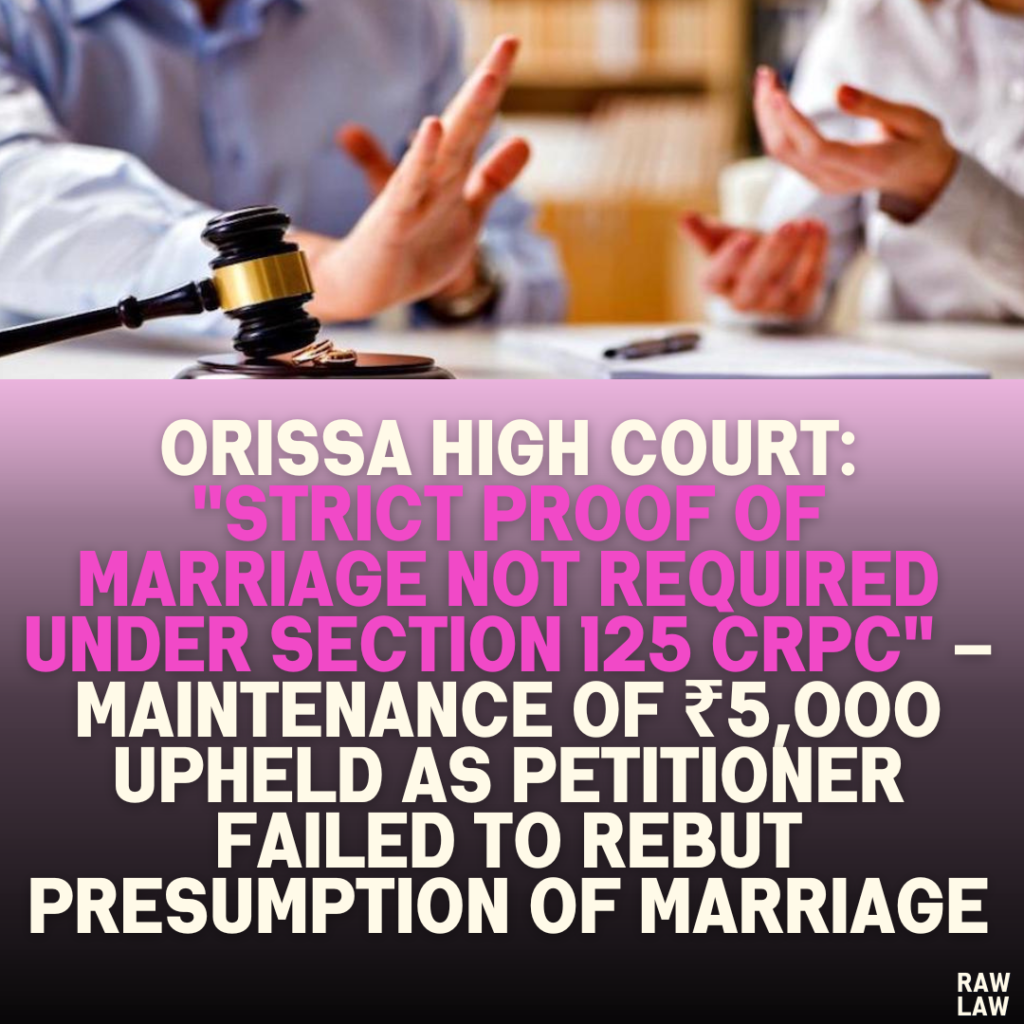Court’s Decision:
The Orissa High Court dismissed the revision petition challenging the Family Court’s decision to grant maintenance of ₹5,000 per month to the opposite party (OP). The court emphasized that strict proof of marriage is not a requirement under Section 125 CrPC. It upheld the Family Court’s conclusion based on evidence of cohabitation and societal acknowledgment of the relationship. The court noted that findings in such proceedings are based on rebuttable presumptions, which were not adequately countered by the petitioner. Reappreciation of evidence is impermissible in a revision petition unless the findings are unsupported by evidence or grossly perverse.
Facts:
- The OP filed a claim for maintenance under Section 125 CrPC, asserting that she was the wife of the petitioner.
- The Family Court granted her maintenance, relying on documentary evidence, witness testimonies, and societal acknowledgment of their relationship.
- The petitioner disputed the existence of a valid marriage, arguing that the Family Court erred in presuming their relationship to be marital.
- The Family Court held that strict proof of marriage was not necessary under Section 125 CrPC, provided foundational facts supported the claim.
Issues:
- Whether strict proof of marriage is required to grant maintenance under Section 125 CrPC.
- Whether the findings of the Family Court regarding the petitioner and OP’s relationship could be challenged in a revision petition.
Petitioner’s Arguments:
- The petitioner denied any marital relationship with the OP, claiming that the evidence presented was insufficient to prove the marriage.
- He argued that the Family Court’s decision to grant maintenance was based on assumptions rather than conclusive proof.
- The petitioner requested the High Court to overturn the Family Court’s findings, citing lack of formal marriage.
Respondent’s Arguments:
- The OP submitted that she had sufficient evidence, including testimony and a document (Exhibit 9), to prove her relationship with the petitioner.
- She argued that under Section 125 CrPC, the law does not demand strict proof of marriage and prioritizes preventing destitution.
- The OP also highlighted witness testimonies confirming that the petitioner and she lived as husband and wife.
Analysis of the Law:
The High Court analyzed the provisions of Section 125 CrPC and key precedents:
- Section 125 CrPC:
- This provision aims to protect women, children, and parents from destitution by granting maintenance.
- It does not require strict proof of marriage but relies on foundational facts like cohabitation and societal acknowledgment.
- Key Precedents:
- D. Velusamy v. D. Patchaiammal:
- The Supreme Court held that a “relationship in the nature of marriage” qualifies for maintenance under the Domestic Violence Act, which is closely related to Section 125 CrPC.
- Such a relationship includes cohabitation, societal acknowledgment, and mutual understanding akin to marriage.
- Kamala v. M.R. Mohan Kumar:
- It was held that cohabitation and societal acknowledgment of a relationship as husband and wife create a rebuttable presumption of marriage under Section 125 CrPC.
- The burden of disproving this presumption lies on the person disputing the relationship.
- D. Velusamy v. D. Patchaiammal:
Precedent Analysis:
The High Court referred to the above cases, emphasizing that the law prioritizes the welfare of the claimant over rigid formalities. The societal acknowledgment of a relationship carries significant weight in maintenance claims. Courts have consistently held that Section 125 CrPC proceedings are not intended to conclusively determine marital status but to address the immediate needs of destitute individuals.
Court’s Reasoning:
- Rebuttable Presumption of Marriage:
- The court observed that cohabitation and societal acknowledgment raised a presumption of marriage, which the petitioner failed to rebut.
- Findings under Section 125 CrPC are not conclusive and are based on the principle of preventing destitution.
- Role of Evidence:
- The Family Court had relied on Exhibit 9, witness testimonies, and societal acknowledgment to establish the relationship between the parties.
- Eight witnesses for the OP corroborated her claims, whereas the petitioner’s evidence was insufficient to discredit the findings.
- Scope of Revisional Jurisdiction:
- The court reiterated that revisional courts are not permitted to reappreciate evidence unless the findings are unsupported by evidence or grossly perverse.
- In this case, the petitioner could not present any evidence to substantiate his claims or discredit the Family Court’s conclusions.
Conclusion:
The High Court dismissed the revision petition, affirming the Family Court’s decision to grant maintenance to the OP. It held that the petitioner failed to rebut the presumption of marriage and could not establish any ground to interfere with the findings of the Family Court.
Implications:
- This judgment reinforces the protective intent of Section 125 CrPC, emphasizing that the provision is meant to provide relief without stringent formalities.
- It underscores the importance of societal acknowledgment and cohabitation in determining claims for maintenance.
- The decision affirms that revisional courts cannot overturn factual findings unless they are unsupported by evidence or grossly unreasonable.




Pingback: Supreme Court Expunges Adverse Remarks Against Additional District and Sessions Judge Over Bail Order; Criticism of Subordinate Judges Must Be Addressed Administratively, Not Through Judicial Orders - Raw Law